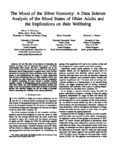The Mood of the Silver Economy: A Data Science Analysis of the Mood States of Older Adults and the Implications on their Wellbeing
| dc.contributor.author | PALOMINO, MARCO | |
| dc.contributor.author | Allen, R | |
| dc.contributor.author | Aider, F | |
| dc.contributor.author | Tirotto, FA | |
| dc.contributor.author | Giorgi, I | |
| dc.contributor.author | Alexander, H | |
| dc.contributor.author | Masala, G | |
| dc.date.accessioned | 2022-11-07T11:31:32Z | |
| dc.date.available | 2022-11-07T11:31:32Z | |
| dc.date.issued | 2022-09-26 | |
| dc.identifier.issn | 2300-5963 | |
| dc.identifier.uri | http://hdl.handle.net/10026.1/19859 | |
| dc.description.abstract |
For the first time in the history of humanity, the number of people over 65 surpassed those under 5 in 2018. Undoubtedly, older people will play a significant role in the future of the economy and society in general, and technological innovation will be indispensable to support them. Thus, we were interested in learning how home automation could enable older people to live independently for longer. To better understand this, we held focus groups with UK senior citizens in 2021, and we analyzed the data derived from them from the perspective of affective computing. We have trained a machine learning classifier capable of distinguishing moods commonly associated with older adults. We have identified depression, sadness and anger as the most prominent mood states conveyed in our focus groups. Our practical insights can aid the design of strategic choices concerning the wellbeing of the ageing population. | |
| dc.format.extent | 251-258 | |
| dc.language.iso | en | |
| dc.publisher | PTI | |
| dc.title | The Mood of the Silver Economy: A Data Science Analysis of the Mood States of Older Adults and the Implications on their Wellbeing | |
| dc.type | conference | |
| plymouth.date-start | 2022-09-04 | |
| plymouth.date-finish | 2022-09-07 | |
| plymouth.volume | 32 | |
| plymouth.conference-name | 17th Conference on Computer Science and Intelligence Systems | |
| plymouth.publication-status | Published online | |
| plymouth.journal | Communication Papers of the 17th Conference on Computer Science and Intelligence Systems | |
| dc.identifier.doi | 10.15439/2022f50 | |
| plymouth.organisational-group | /Plymouth | |
| plymouth.organisational-group | /Plymouth/Faculty of Science and Engineering | |
| plymouth.organisational-group | /Plymouth/Faculty of Science and Engineering/School of Engineering, Computing and Mathematics | |
| plymouth.organisational-group | /Plymouth/REF 2021 Researchers by UoA | |
| plymouth.organisational-group | /Plymouth/REF 2021 Researchers by UoA/UoA11 Computer Science and Informatics | |
| plymouth.organisational-group | /Plymouth/Users by role | |
| plymouth.organisational-group | /Plymouth/Users by role/Academics | |
| dcterms.dateAccepted | 2022-07-07 | |
| dc.rights.embargodate | 2022-11-10 | |
| dc.rights.embargoperiod | Not known | |
| rioxxterms.versionofrecord | 10.15439/2022f50 | |
| rioxxterms.licenseref.uri | http://www.rioxx.net/licenses/all-rights-reserved | |
| rioxxterms.type | Conference Paper/Proceeding/Abstract |


